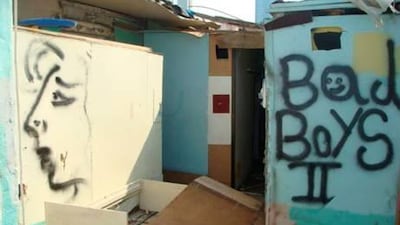DUBAI // Hundreds of dilapidated buildings in Dubai are being torn down because they are a magnet for crime, a security risk and a threat to health and safety.
The municipality has demolished 145 in the past three months and will begin destroying 400 more in coming weeks.
MORE ON BUILDING DEMOLITIONS
Villa demolitions cause uproar
Residents in villas slated for demolition have two days to get out of their brand new waterfront homes.
Tenants victims of rise in demolitions
Up to 30 per cent of structures in the capital need replacing, but those who live in them say they cannot afford higher rents elsewhere.
Curbs on demolition contractors in Abu Dhabi
As more dilapidated buildings come down, shady operators with old equipment are unlikely to meet city standards.
The rundown properties are a cover for crime ranging from drug and substance abuse to sexual assault, violence and murder, police and municipality officials say.
"In cooperation with Dubai Police, we found these locations were being used for criminal activity," said Jaber Ahmed Abdullah Al Ali, the acting head of the municipality's Building Inspection section.
"In some buildings we found that murders took place, illegal substances such as alcohol were hidden and criminals used them as hiding places."
Colonel Jamal Al Jallaf, the deputy director general of Crime Monitoring Affairs at Dubai Police, said abandoned buildings posed a security concern for several reasons.
"These houses are, in many cases, used for activities such as storing illegal products, fights between teenagers or housing for illegals," he said.
Police also say teenagers gather in abandoned buildings to use drugs or inhale butane, and there have been cases of physical and sexual abuse.
"That is why we always seek to eliminate these houses and are working closely with the municipality on the issue," Col Al Jallaf said.
When police patrols spot an abandoned house they notify the municipality, which sends registered letters to the owners giving them a month to institute repairs.
The municipality also advertises in newspapers two weeks before demolition, calling for action to be taken. If the owners fail to act by the deadline, demolition engineers move in.
Owners must pay the cost of the demolition and 20 per cent of the administrative expenses.
The cost of demolition is measured per square foot and depends on location. If the owners fail to pay for the cost of demolition, development of the land is frozen and other businesses they own may also be affected.
Those whose buildings are demolished can rebuild on the land, provided strict guidelines are followed.
"Many structures were left for up to three years without any maintenance," Mr Al Ali said. "Owners must take responsibility for their properties and maintain them regularly and make sure to lock them well."
He said the most common reason for abandonment was a lack of responsibility, and some property had been the subject of court cases related to inheritance claims.
"You have to also consider what type of negative image this is for the city, such buildings that are a health hazard and home to criminal activity," he said.
Mr Al Ali said he hoped action taken by the municipality would "scare" the remaining building owners into action. "In a few days' time, we will send the next batch of warnings to the owners of the remaining buildings left abandoned. If we do not get a response we will again begin demolishing," he said.
Craig Plumb, the head of research for the Middle East and North Africa at the property services company Jones Lang LaSalle, said demolitions were part of the cycle of life in the property market.
"If you look at property markets in other mature cities like London and Hong Kong, it is a common recycling process," he said. "It is normal that as Dubai grows, some buildings will reach the end of their lifespan.
"These buildings have obviously been in a state of disrepair for a long time and the municipality has been in negotiation with building owners who should be using the opportunity to improve and refurbish the land. It is reasonable for the government to say the buildings are an eyesore and a potential hazard.
"It is also an opportunity for popular areas such as Bur Dubai and Deira to have new buildings. It helps to keep the city as a whole vibrant."
Members of the public can report abandoned buildings to the municipality by calling 800900.
melshoush@thenational.ae
* With additional reporting by Wafa Issa

